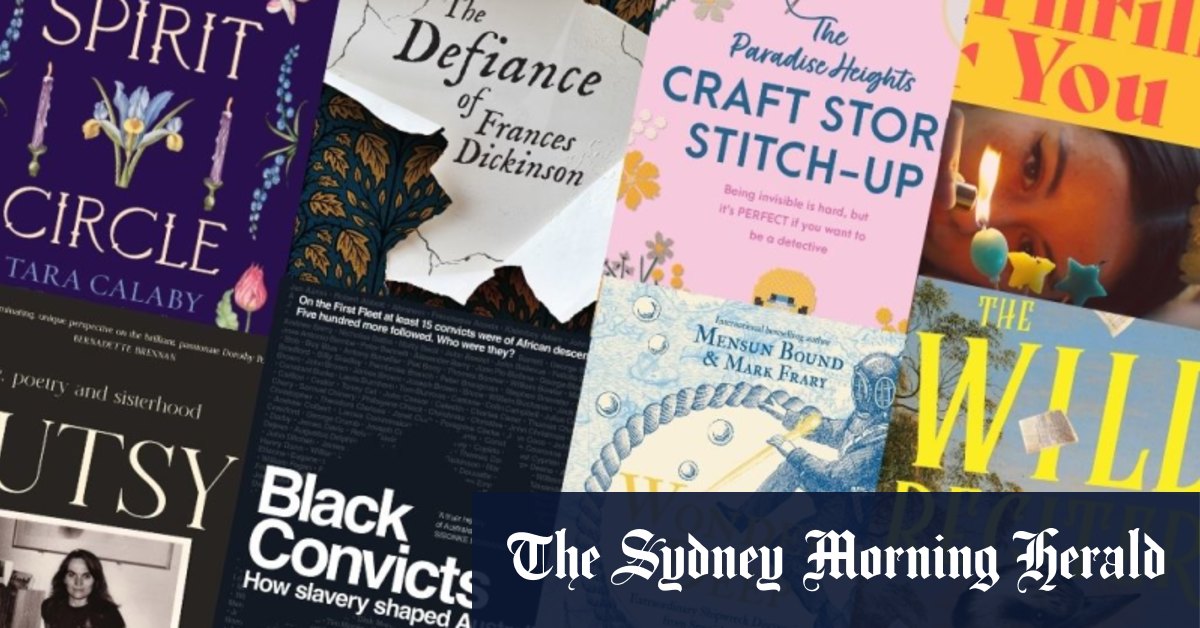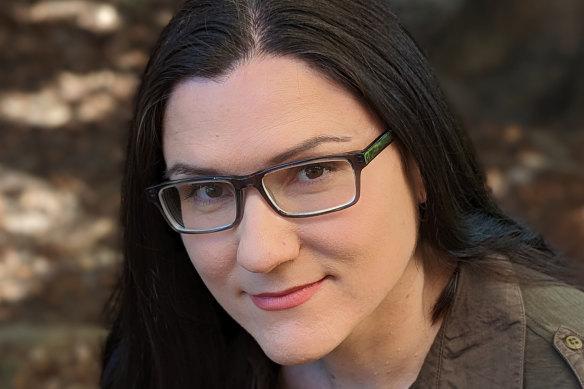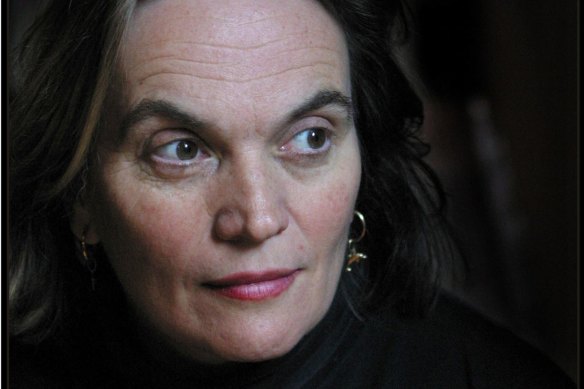
From supernatural romance to cosy crime and a sister’s tribute to acclaimed Australian poet Dorothy Porter, this selection of eight new releases might just have something to suit everyone.
FICTION PICK OF THE WEEK
The Spirit Circle
Tara Calaby, Text, $34.99

Tara Calaby has created an emotionally intelligent and moving supernatural romance for actual adults.
A sapphic romance and a ghostly mystery await readers of Tara Calaby’s The Spirit Circle. In colonial Melbourne, the young Ellen Whitfield is secretly in love with her best friend, Harriet. It is with mixed feelings she greets the news that Harriet will soon be her sister-in-law. When Harriet unexpectedly breaks off the engagement, however, Ellen is mystified, and her consternation increases when she learns that Harriet believes she has been instructed to do so by the spirit of her dead mother. To Ellen’s sceptical mind, her friend is a victim of charlatanry: she has fallen under the influence of “The Church of the Spirit”, led by the charismatic spiritualist Caroline McLeod – an all-female group claiming to commune with the dead from a forbidding mansion in East Melbourne. As Ellen infiltrates their gatherings, hoping to find evidence it’s all bunkum, she discovers a more complicated clandestine society, in which women bond in platonic and spiritual union, and truths beyond the grasp of Victorian-era society can be expressed. Calaby has created an emotionally intelligent and moving supernatural romance for actual adults, full of deft period detail.
Loading
The Defiance of Frances Dickinson
Wendy Parkins, Affirm Press, $34.99
Wendy Parkins quotes George Eliot in the epilogue to her latest novel: “An unloving, tyrannous, brutal man needs no motive to prompt his cruelty; he needs only the presence of a woman he can call his own.” That was written in 1858, when divorce was extremely difficult for a woman to pursue in the ecclesiastical courts, and rape within marriage was legally impossible in the UK. The Defiance of Frances Dickinson follows the real-life heiress who married one Lieutenant John Geils at just 18, bore him four daughters, and suffered terrible abuse at his hands. Seven years later, in 1845, Frances filed for divorce on the grounds of adultery, cruelty, and sodomy in a trial that scandalised London. (She would go on to become a journalist and travel writer who knew Wilkie Collins and Charles Dickens.) This epistolary novel ends with the divorce. Perhaps it cleaves too closely to source material – often grim reading, though the liveliness of Frances’ correspondence is captured, too – for a straight historical novel, an autofiction or even history might have worked better. Still, Parkins’ subject is a fascinating figure, and the insight into domestic violence and coercive control remains relevant.
The Paradise Heights Craft Store Stitch-Up
Kate Solly, Affirm Press, $34.99
Diagnosed with ADHD halfway through writing this novel featuring a neurodivergent amateur sleuth, Kate Solly has serendipitously tuned in to another growing trend – cosy crime. The publishing fad seems to be a revival of Agatha Christie’s Miss Marple formula, in which unobtrusive, seemingly unlikely detectives use these qualities to help solve crimes in a thoroughly reassuring way. Richard Osman’s Thursday Murder Club series is a good example of the genre, which commonly features retirees, or macrame groups, or rural bookshop owners puzzling out mysteries. In The Paradise Heights Craft Store Stitch-Up, our sleuth is Fleck Parker, a mother of three young children and into crafts. Fleck’s friend and fellow mum Trixie is accused of a despicable act – theft from the women’s charity Many Hands, renowned for its charming craft store. Determined to clear Trixie’s name, Fleck stakes out playgrounds and uses the common assumption – that she’s too busy mothering to investigate – to disguise her efforts to find the culprit. What some find rosy and cosy, others may find cloying and annoying. This one left me somewhere in between.
So Thrilled for You
Holly Bourne, Hachette, $32.99
Arson at a baby shower? It’s an incendiary plot device, and sparks certainly fly as four university friends, now in their 30s, reunite to celebrate Nicki’s pregnancy. Charlotte, who organised the event, is desperate for a baby of her own and might be jealous of her friends with children. Steffi has decided not to have kids but feels the weight of judgment for a choice she’s perfectly happy about. Lauren finds motherhood horrific and has been hiding just how much of a toll it has taken. As for Nicki, well, the baby shower wasn’t her idea. As the police investigate the suspects and piece together evidence of what happened in the fire’s aftermath, the shocking truth is revealed. So Thrilled for You is too light on novelistic skill for the kind of genre fiction it attempts. This is no Big Little Lies. The spell’s too often broken by inexpert writing (or perhaps poor editing) and although the social milieu and pressures are briskly sketched, the narrative drags, and some characters lack psychological depth.
NON-FICTION PICK OF THE WEEK
Gutsy Girls
Josie McSkimming, UQP, $34.99

Poet Dorothy Porter is remembered by her sister, Josie McSkimming, in Gutsy Girls.Credit: Cathryn Tremain
As a girl, Josie McSkimming idolised her charismatic older sister, Dorothy Porter, and revelled in her early success as a fierce new voice in Australian poetry. On the surface, though, they couldn’t be more different: McSkimming was an evangelical Christian fundamentalist while Porter was raw, transgressive, queer. But their bond as sisters and their shared experiences of their father’s frightening volatility went deeper than their differences. Porter, who died in 2008, still visits McSkimming in her dreams, insisting “it’s not a dream. I am alive.” In this skilfully drawn portrait, she is very much alive as she protects her sisters (and mother) from their father’s rage, is consumed by her passion for poetry and sex, gradually learns what “real love means, not rapture” and gives her sister the courage to leave the church. Gutsy Girls keeps Porter’s voice alive, whetting the reader’s appetite for her singular verse.
Black Convicts
Santilla Chingaipe, Scribner, $34.99
In 1823, the respected Khoi chief and opponent of colonialism David Stuurman was transported from South Africa to NSW. While he remains a revered figure in South Africa, his story was – like those of the nearly 500 black convicts mentioned in this book – largely erased from the whitewashed diorama of Australian history. Unlike Stuurman, most of these prisoners were enslaved or formerly enslaved. The youngest convicts were two girls from Mauritius, Constance Couronne and Elizabeth Verloppe, aged nine and 12 respectively when sent to Australia. The intersection of slavery and the convict system lies at the heart of this remarkable book as Chingaipe takes us on her journey through the colonial archive and beyond. Black Convicts doesn’t just open our eyes to all we’ve been blind to, it also enlarges, enriches and deepens the complex terrain of Australia’s history.
Wonders in the Deep
Mensun Bound and Mark Frary, Simon & Schuster, $49.99
The phrase “sunken treasure” conjures chests of gold, jewels and priceless booty. But as marine archaeologists know, the real value of stuff found in shipwrecks lies in what it can tell us about human history and the catastrophe that sent the vessel to the bottom of the sea. This is a narrative told through a collection of eclectic objects – a fertility statue from a Phoenician vessel from the sixth century BC, thousands of pieces of 15th-century Vietnamese porcelain pulled up in fishing nets, a Friar Tuck figurehead from the treacherous waters around the Isles of Scilly. Along with many other durable objects featured in this intriguing history are more fragile memento mori such as human remains from the ill-fated Batavia, which ran aground in 1629 off the coast of Western Australia, and a crew member’s poignant note to his wife after a Russian submarine suffered an explosion in 2000.
The Wild Reciter
Peter Kirkpatrick, MUP, $34.99
Loading
As someone whose parents met at elocution lessons and whose love of poetry was instilled by the verse our father read to us as children, I was primed to relish this book about the story of poetry in popular Australian culture, from bush ballads to spoken word and slam. But such a background is by no means a prerequisite for enjoying this erudite and entertaining work. Beginning with the rise of recited poetry spurred by the elocutionary movement in the 18th century, The Wild Reciter examines key moments in the 20th century when poetry found a mass audience via new technologies such as the gramophone, radio, film and internet, and reminds us that performed poetry – spoken and sung – permeates our culture more than we might realise. A fact brought home to me as I found myself reading poetry from Shakespeare to Banjo Paterson aloud to my father in the months before his death.



